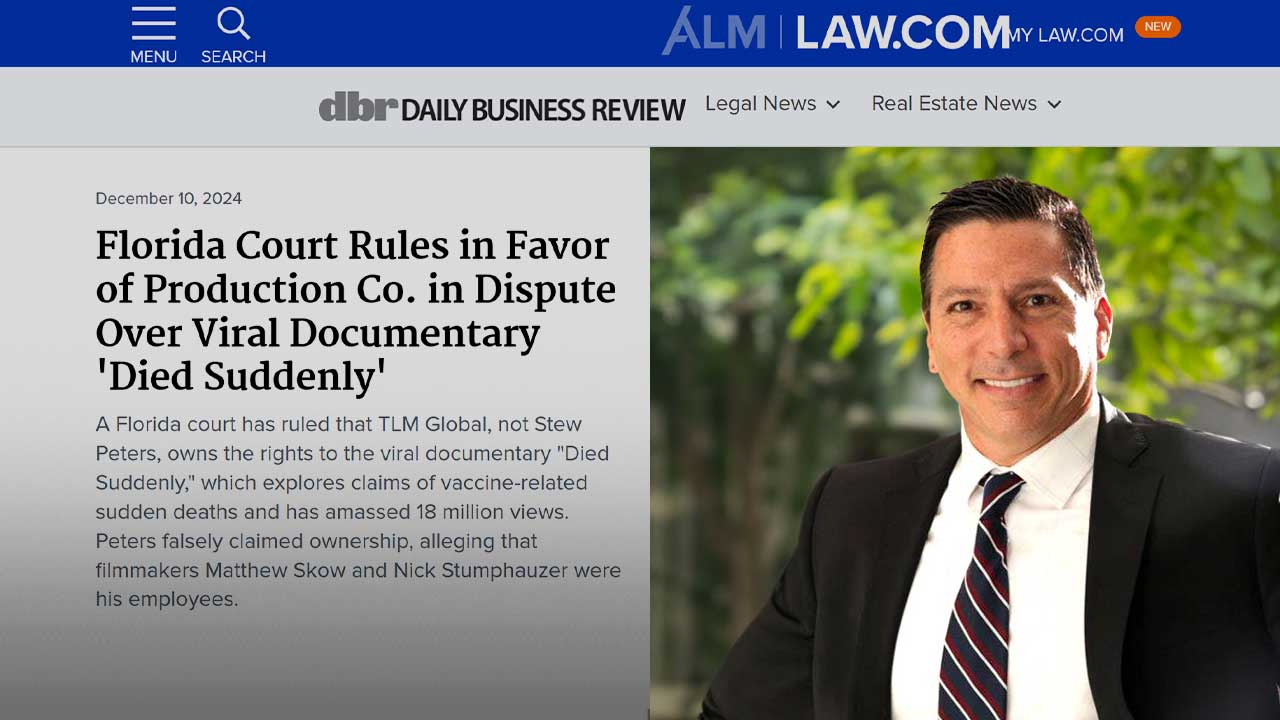A Florida court has ruled that TLM Global, not Stew Peters, owns the rights to the viral documentary “Died Suddenly,” which explores claims of vaccine-related sudden deaths and has amassed 18 million views. Peters falsely claimed ownership, alleging that filmmakers Matthew Skow and Nick Stumphauzer were his employees.
A Florida production company is claiming legal victory in federal court Monday in a dispute over ownership and control of a documentary film.
U.S. District Judge Ryon M. McCabe of Florida’s Southern District issued a preliminary injunction as set forth in his report and recommendation order prohibiting Stew Peters, a Minnesota-based media figure, from using the “Died Suddenly” title in any capacity, citing reputational harm caused by Peters’ extremist and inflammatory social media posts.
Ruling in favor of TLM Global over copyright and trademark rights to the viral documentary McCabe wrote, “The parties have filed cross-motions for preliminary injunctions, each seeking to prevent the other from using the film and intellectual property associated with the film.”
The case is Fokiss v. TLM Global.Co-defendants are listed as TLM Vision Inc., Edward Szall, Lauren Witzke, Matthew Skow and Nicholas Stumphauzer.
The ownership tug-of-war between controversial conservative internet sensation Peters as the plaintiff and defendant TLM Global centers around “Died Suddenly,” a 2022 docu-movie about the COVID-19 crisis and alleged deaths resulting from vaccinations. Peters claimed the film, which amassed more than 18 million viewers, was his production and challenged ownership.
The defendant claims Peters has promoted himself and his company with “extreme and offensive rhetoric” and his reputation is harming TLM Global’s name and likeness.
Peters was given 14 days to submit an objection to U.S. District Judge K. Michael Moore, and late Tuesday, his legal team said it plans to act on.
“The R&R is not an order of the Court, and our client intends to respectfully voice its objections to it and to continue litigating all the issues in this case,” The Stew Peter’s Network legal team said in a statement to the Daily Business Review about the latest litigation developments.
Stew Peters Network attorneys are listed as Elijah A. Levitt, Salvatore Fazio of 500 Law in Miami, Cintia N. Calevoso of Calevoso Law in Coral Springs, and Travis James DeCosta of DeCosta Law in Vero Beach.
No Contract
“There were no written agreements between the parties, nothing in writing,” said TLM Global attorney Matthew S. Nelles of Johnson & Martin in Fort Lauderdale. “Because there was nothing in writing, the only way that Peters could have ever owned the copyrights is if the film writers were his employees and all of the evidence in the case was inconsistent with Skow and Stumphauzer being employees. They worked for TLM Global. They were W-2 employees of TLM Global.”
McCabe noted that the injunction granted was partly based on the argument of irreparable harm caused by Peters’ association with the “Died Suddenly” brand due to Peters’ inflammatory online rhetoric.
“Based on these standards, the Court finds that TLM Global faces irreparable harm because Peters has promoted himself and his company Fokiss with extreme and offensive rhetoric on social media and other platforms,” McCabe noted. “On November 24, 2022, Peters made a social media post linking a news story about the U.S. Women’s Soccer’s team, adding the following notation: ‘These fudgepacking, pillow-biting Hershey highway butt bandits are always the perverts that target our kids for grooming and pedophilia’ [and] On January 15, 2024 (MLK Day), Peters made a social media post claiming that Dr. King was a ‘plagiarizer, drunkard, woman beater and serial adulterer.’ [and] On February 18, 2024, Peters made a social media post linking a news story with the following headline: ‘Stew Peters: Border Wall Should be Armed with ‘AI Powered’ Guns so that Migrants ‘Get Shot in the Brain.'”

U.S. District Judges Ryon M. McCabe, left, and K. Michael Moore, right. Courtesy photos
In granting the defendant’s motion and denying the plaintiff’s relief, the judge addressed the balance of harms.
“The Court finds that defendants satisfy this burden,” McCabe said. “If the Court wrongly enters the preliminary injunction, thereby depriving Fokiss of its ability to make use of the film, Fokiss faces a risk of lost revenue from the film. If, on the other hand, the Court wrongly denies the preliminary injunction, thereby allowing Fokiss to make continued use of the film, TLM Global faces a risk of reputational damage arising from the association of its intellectual property with extreme and offensive rhetoric … this reputational damage may be so severe as to be incapable of compensation through monetary damages. The Court finds the potential harm to TLM Global constitutes the greater injury, thus weighing in favor of entry of a preliminary injunction.”
The Dispute
TLM Global, a Vero Beach-based production company, employed Skow and Stumphauzer as filmmakers, who directed, filmed, edited, and produced the documentary. Peters notes he is the film’s executive producer and presenter.
TLM Global allowed the film to be distributed via Rumble, a video-sharing platform, through the Stew Peters Network. However, Peters claimed he owned the copyrights and trademark to the film, asserting that the filmmakers were his employees. TLM Global refuted these claims and filed for the copyright and trademark rights to the title. Peters filed the first restraining order, which was eventually dissolved.
Under U.S. copyright law, the creator of a work is the default owner unless it qualifies as a “work made for hire” or is transferred through a signed agreement. Peters’ argument hinged on his claim that Skow and Stumphauzer were employed by his network when the film was created.
“We want the public to associate ‘Died Suddenly’ with a certain theme, and it’s not the violent, hateful rhetoric that Peters propagates,” Nelles said.
Source: LAW.com By Lisa Willlis

